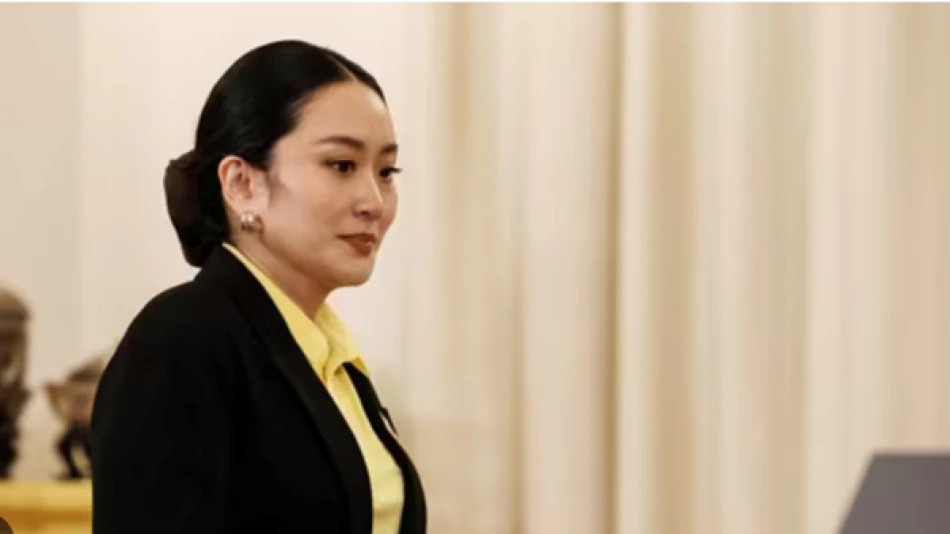
Thailand's Constitutional Court Ousts Prime Minister in Dramatic Decision
Thailand's Constitutional Court Ousts PM Over Cambodia Border Dispute Phone Call
Thailand's Constitutional Court dismissed Prime Minister Paetongtarn Shinawatra and her government Friday following a controversial phone conversation with Cambodia's former Prime Minister Hun Sen regarding a border dispute. The ruling marks another chapter in Thailand's history of judicial interventions in politics, potentially destabilizing regional diplomatic efforts and creating fresh uncertainty for investors in Southeast Asia's second-largest economy.
The Leaked Phone Call That Toppled a Government
A nine-judge panel ruled that Shinawatra failed to meet the ethical standards required of prime ministers during her June phone conversation with Hun Sen. Leaked excerpts from the call apparently revealed discussions about the ongoing border dispute between the two nations, though the court found her handling of the matter violated constitutional principles.
The timing of this ruling is particularly significant, as Thailand and Cambodia have been working to resolve territorial disputes that have periodically flared over the past decade, often centered around the Preah Vihear temple complex and surrounding areas.
Thailand's Pattern of Political Upheaval
The Shinawatra Dynasty Under Fire
This dismissal continues a troubling pattern for the Shinawatra political dynasty. Paetongtarn's father, Thaksin Shinawatra, was ousted in a military coup in 2006, while her aunt Yingluck Shinawatra was removed by the Constitutional Court in 2014 before being overthrown by another military coup.
The repeated targeting of Shinawatra family members reflects Thailand's deep political polarization between urban elites, the military establishment, and rural populations who have consistently supported Shinawatra-backed parties at the ballot box.
Constitutional Courts as Political Weapons
Thailand's Constitutional Court has become increasingly active in political matters, often stepping in to resolve disputes that other democratic institutions might handle through legislative processes. This judicial activism contrasts sharply with more stable democracies in the region, such as those found in Singapore or Malaysia, where constitutional courts typically maintain greater distance from day-to-day political disputes.
Regional Implications and Investor Concerns
Border Diplomacy in Jeopardy
The court's decision could complicate ongoing diplomatic efforts to resolve Cambodia-Thailand border issues. Hun Sen, despite stepping down as Cambodia's prime minister, remains influential in regional politics. Any disruption to bilateral dialogue mechanisms could reignite tensions along disputed border areas, potentially affecting trade routes and regional stability.
Economic Uncertainty Returns
For investors, this political upheaval signals a return to Thailand's chronic governmental instability. The Thai baht and stock market have historically shown sensitivity to constitutional crises, as foreign investors worry about policy continuity and the rule of law. Unlike countries such as Vietnam or Indonesia, which have achieved greater political stability in recent years, Thailand continues to struggle with institutional conflicts that undermine long-term economic planning.
What Comes Next
The dismissal creates an immediate succession crisis, as Thailand must now form a new government or call fresh elections. Given the Shinawatra family's continued popularity among rural voters, any new electoral contest could simply reproduce the same political tensions that led to this constitutional crisis.
More broadly, this ruling demonstrates how Thailand's democratic institutions remain fragile compared to regional peers. While countries like Taiwan and South Korea have successfully consolidated their democratic transitions, Thailand appears trapped in a cycle where electoral victories can be nullified through judicial or military intervention, creating a perpetual state of political uncertainty that ultimately weakens both governance and economic development.
Most Viewed News

 Layla Al Mansoori
Layla Al Mansoori






